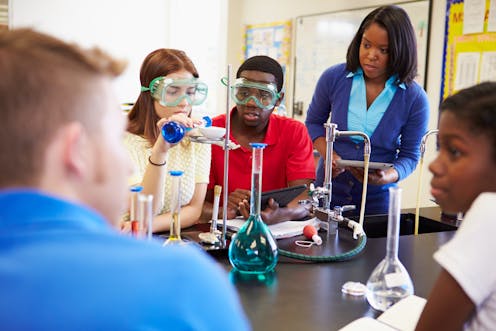Science teachers sacrifice to provide lab materials for students
Urban and rural science teachers often lack funding for science lab materials and pay out of pocket to provide those materials for their students, new research detailed in this Speed Read shows.

Whatever salary the science teacher at your local public school makes per year, subtract US$450.
That’s how much money the typical middle and high school science teacher spends out of pocket each year on science lab materials. The $450 figure is based on a study we recently conducted to determine if science teachers have adequate funding to teach laboratories and science investigations. In this study, 94.6 percent of science teachers reported they spend money out of pocket for instructional materials.
We are both science education researchers with a keen interest in matters of equity in education.
Our study involved 696 middle and high school science teachers nationwide, and 70 percent of teachers reported not having adequate funding to provide high-quality science instruction for their students. Although 30 percent of science teachers reported they have enough funding for lab materials, many of them still spend money out of pocket for materials.
The lack of funding was worse in rural and urban areas, where the percentage of secondary science teachers who reported inadequate funding – 73 percent and 78 percent, respectively – was higher than the 63 percent of suburban teachers who said they had inadequate funding.
Also, teachers in suburban areas reported on average receiving 2.5 times more funds – $604.90, to be exact – than teachers in urban areas, who reported having $242.47 on average. And suburban teachers had 1.3 times more funds than teachers in rural areas, who reported having $462.93 on average for science instructional materials. I added on average - just to make sure we’re clear with the data
Urban and rural schools are also more likely than suburban ones to face staffing challenges, putting rural and urban students on unequal footing when it comes to majoring in science-related fields and pursuing science careers.
More need, higher cost
Science teachers aren’t the only teachers who spend out of pocket to purchase supplies for students. However, science teachers face challenges that other teachers don’t.
For instance, science courses often require more money than other subjects due to their hands-on nature. The supplies used in these classes need to be replaced frequently. There are also many laboratory experiments, such as dissections or chemical reactions, in which materials are only able to be used once.
In our study, science teachers indicated they sometimes conduct less intricate labs with grocery store materials.
So why does any of this matter?
Teachers are being asked to prepare the next generation of scientifically literate citizens to enter a highly technical workforce. Providing teachers with limited funds for science instruction could hinder students’ ability to compete globally for jobs.
If this downward trend in funding continues, we believe the quality of science education found in public schools will suffer drastically.
As the nation wrestles with the issue of making sure teachers are paid adequately, efforts should also be made to secure adequate funds to educate and prepare the next generation of scientists and engineers.
The authors do not work for, consult, own shares in or receive funding from any company or organisation that would benefit from this article, and have disclosed no relevant affiliations beyond their academic appointment.
Read These Next
FDA’s abrupt flip-flop on Moderna’s mRNA flu shot highlights growing risks to drug-makers of investi
After pushback, the agency reversed course and agreed to review Moderna’s application after all.
How Jesse Jackson set the stage for Bernie Sanders and today’s progressives
The coalitions that Jackson built during his presidential campaigns created enduring infrastructure…
How deregulation made electricity more expensive, not cheaper
Deregulation promised competition but delivered middlemen instead.






